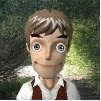Neil's true 'solo' release, "Try Whistling This", came out in 1998. My copy was either a cut-out or a promo -- either way, my good luck! A handful of various producers, rotating band members -- a recipe for disaster in some hands, but Neil and his latest crop of songs are the focus, and there are many excellent songs: "Souvenir", "Try Whistling This", "She Will Have Her Way" (very Beatle-y), "Sinner", "Astro", "Faster Than Light", and the perfect closer "Addicted". Okay, maybe it's a bit fussy production-wise on some songs, but that just means there are subtle touches to discover after the first few listens.
One of the things I really enjoy about Neil's lyrics is that they are both personal and universal, obscure and specific. Songs like "Into Temptation" or "Hole in the River" are fairly straightforward, as is "Addicted" -- but then he'll throw in a metaphor that I don't quite understand, so I have to fill in the blanks and take a guess. I get to find my own meaning in the song; given a sketch of what it's generally about, I get to infer my own resonance.
I was lucky enough to find a copy of the DVD "Neil Finn: Sessions at West 54th", a short-lived live-in-the studio series, hosted by David Byrne (!) This features Neil performing tracks from "Try Whistling This", plus a few Crowded House songs. Best part: as the show opens and Neil bounces onstage, he walks past the acoustic guitarist -- who looks maybe 15. Turns out it Neil's son, and this was my first indication how important family is to Neil. Later albums and DVDs feature so many family members, it's like a family reunion, with music!

Neil's album "One Nil" came out in 2001 as an import, and, spiffed up, resequenced, with 2 newer songs, came out here in 2002 as "One All". The 2 new songs on "All" are better than the ones dropped from "Nil", but the mix on "All" is a little too cleaned up for me. "Lullaby Requiem", a song about the passing of Neil's mother, goes a little over the top with the childen's choir, but in this instance, it's understandable.
2001 also saw another project from "Neil Finn and Friends: Live at the St. James", a project where Neil invites friends like Lisa Germano, Eddie Vedder, Johnny Marr and more (including 2 members of Radiohead) to New Zealand to rehearse a batch of Neil songs, among others, and perform them live. It's not the tired 'supergroup' concept, but more of a 'let's toss it together and see what sticks' fun experiment. I had the CD, but got rid of it when I saw the DVD. The DVD has 26 performances, the CD maybe 14 or 16 -- and it's so sad! The CD reflects the loss of Neil and Tim's mother, among others, and it's skewed to the view of someone coming to terms with mortality. The DVD, on the other hand, feels more like a celebration, and it includes Tim singing "I See Red" with Eddie Vedder, backed by (Neil's son) Liam's band, as Neil watched from a couch just off the stage -- you can't beat that! Johnny Marr also performs a song of his that I have yet to find anywhere else, and Neil does a cover of The Smith's "There Is A Light That Never Goes Out". It's also fun to see Lisa Germano, whose own material tends to be dark and introspective, step up and be fully and joyfully involved in the proceedings. This is one of my favorite DVDs, ever.
Next time: Finn Brothers once again, and the return (?) of Crowded House.





















